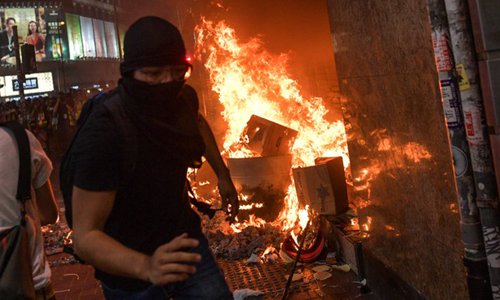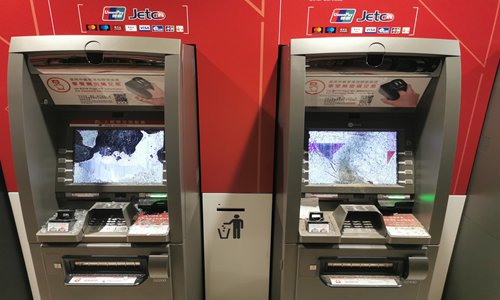HOME >> CHINA
Mask ban sends warning
By Chen Qingqing, Fan Lingzhi and Bai Yunyi in Hong Kong Source:Global Times Published: 2019/10/7 23:28:39 Last Updated: 2019/10/8 0:18:36
Assaulting civilians oversteps bottom line: HK police

Rioters burn items at the Causeway Bay metro station entrance in Hong Kong on October 4, 2019. Photo: AFP
Hong Kong experienced another weekend of unprecedented rampage after the anti-mask law was enacted on Saturday, as mobs targeted not only Hong Kong police but also commoners. Officials, observers and residents urged strict law enforcement to increase law effectiveness while shaping a social consensus to end the violence.
The Hong Kong Special Administrative Region (HKSAR) government announced the Prohibition on Face Covering Regulation, or anti-mask law, by invoking emergency powers on Friday, which came into effect on Saturday.
For months, the city has been engulfed in widespread violence and mobs attacks, seriously disrupting the public order and jeopardizing safety of ordinary Hongkongers. The new law sparked backlash among black-clad protesters, who staged hit-and-run across the city. Clashes and rampage in consecutive two days paralyzed public transport, converting the city deemed a global financial and business hub into a warzone-like battleground.
The new law sparked backlash among black-clad protesters, who staged a hit-and-run strike across the city. Clashes and rampage over the weekend paralyzed public transport, converting the city deemed a global financial and business hub into a warzone-like battleground.
The new law has begun showing palpable deterrent effect, as the scale and number of protesters wearing masks appeared to be dropping compared to months ago, and so-called peaceful protesters ended their illegal assemblies early before the police arrived, reflecting growing awareness that covering faces at an unauthorized public gathering is an offence.
However, the backlash has led to escalated violence in various districts in Hong Kong, as black-clad rioters vandalized MTR subway stations, shops and store, branches of mainland banks, and even brutally assaulted passerby who held different views or disagreed with such vandalism and craziness.
Groups of masked rioters called as "brave front-line fighters" scattered during the weekend across Hong Kong Island, Kowloon and New Territories.
Ignoring police warnings against illegal gatherings, rioters occupied major roads, blocking public transportation, set fire in MTR stations, hurled Molotov cocktails at police officers and journalists, and they have also been frequently targeting ordinary citizens who resented their violence.

ATMs of a mainland bank in Hong Kong are damaged by rioters during the weekend. Photo: Chen Qingqing/GT
Overstepping bottom line
A elderly taxi driver, who tried to pass through swarms of rioters in Sham Shui Po on Sunday, was roughed-up by mobs, followed by a brutal assault as rioters pinned him to the ground.
Videos circulating online showed his gory face.
Rioters, who then rushed to distorting the narrative of such brutal attack by claiming the driver hit a protester first before he was beaten up. Rioters later smashed his vehicle, and footages showed that rioters kicked his head while his face was covered with blood.
Attacking ordinary people have become common sight amid rioting activities.
Such terror-like acts, which overstepped the moral boundaries of any civilized society, have been disguised by opposition group leaders as an acceptable way of pursuing their freedom and rights, when rights of other Hong Kong people have been severely wrecked and trashed.
More people were outraged by such mob-controlled street violence, which victimizes Hong Kong's majority residents, and some harshly criticized the way of opposition groups to beautify and legitimize the violence.
"Rioters have reached a new height of lawlessness," a resident who only gave his name as Allan, told the Global Times on Sunday in Mong Kok, as masked rioters blocked the roads with long bamboo poles of the kind used in scaffolding.
TVB actress Celine Ma was assaulted by rioters after filming them smashing up a Bank of China ATM outlet.
"They rushed to hit me and snatched my phone," she said, as her mouth bled, according to video footage.
Assaulting civilians oversteps the bottom line of a civilized society, the Hong Kong Police Force said in a public statement on Sunday.
Law enforcement challenges
The hit-and-run strategy has increased challenges for law enforcement. Illegal protesters have shifted from confronting police to vandalizing banks, shops and MTR trains. Most fled quickly before riot police arrived on site.
The Global Times reporter saw some rioters hiding, changing their outfits and throwing away their masks before police came.
Later they pretended to be ordinary passersby to avoid being checked by the police.
After rioters vandalized Shap Pat Heung Rural Committee in Yuen Long on Friday night and hurled several Molotov cocktails toward the police officers, they changed clothes and even snacked at a nearby restaurant, according to images later captured by local media.
In spite of being constantly provoked by rioters, frontline police officers enforce the law in restrained way.
On the first day when the anti-mask law went into effect, police officers stopped some masked people in Central, and let them pass after they found out those people did not commit any crimes.
A man who refused to cooperate with police, holding a long umbrella and wearing a black mask, was taken away to a police car for further questioning.
"The new law will trigger a backlash, but the scale will be downsized thanks to its deterrent effects," Joe Chan Cho-kwong, former chairman of Junior Police Officers' Association, told the Global Times on Sunday.
"However, the violence will not disappear in a short period. Now it's more important that authorities and Hong Kong police are determined to enforce the law," he said.
The anti-mask law forbids protesters covering faces in an unlawful assembly and whoever breaks the law faces imprisonment and a fine of up to HK$25,000.
Social consensus
The backlash showed the law was an effective warning, Stanley Ng Chau-pei, chairman of the Hong Kong Federation of Trade Unions, told the Global Times.
"Although the level of violence has increased, the scale of participation is now diminishing and the police will arrest more who violate the law," he said.
From fear of being retaliated by radicals and standing up to disagree with their terror-like acts, more Hongkongers have a more clear view on the essence of this anti-government movement, as hundreds of shops, stores and MTR stations were vandalized, terrifying more residents.
The law, with its deterrent effects, will help shape a consensus in the Hong Kong society.
"However, in the short term, there will still be a testing the water period when rioters resist and fight back," Li Xiaobing, an expert on Hong Kong, Macao and Taiwan affairs, from Nankai University in Tianjin, told the Global Times.
"The outcome of challenging the law will be more and more apparent."
Meanwhile, observers expected Hong Kong authorities will firmly move forward in quelling violence by taking any measures available into account.
And the HKSAR government should not back off considering the current pressure, according to some observers, as that would give more room for opposition groups to become reckless.
If necessary, the government should come up with more policies by invoking emergency powers such as banning hate speech and terror-instigating acts online, they said.
Posted in: HK/MACAO/TAIWAN